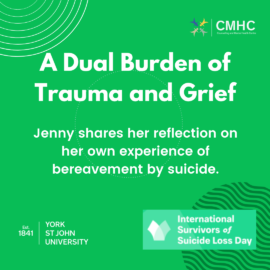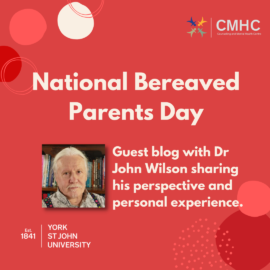Dr John Wilson, Director of the Bereavement Service at CMHC, has specialised in bereavement counselling for 20 years and has recently published ‘The Plain Guide to Grief’, which in plain language, tells you how you can manage your grief following a life changing loss. In todays blog, John speaks to us about the course of grief, what you may experience, and provides some tips and guidance that may help.
The Course of Grief
Every person’s grief is unique, but there is a typical pattern with individual variations. It isn’t possible to put a time on how long each phase will last.
Soon after your loss you are likely to feel numb. There isn’t much distress because it doesn’t feel real. It’s only when the reality sinks in that you can find yourself tearful. Many people try to extend the numb period by avoiding the reality, at least for some of the time. Some people describe this as being ‘in denial’, as if it’s a bad thing, but it can actually help to avoid reminders until you get used to the sad reality. Follow your instincts and grieve your way if you feel it helps. Some people are helped by talking about what happened, to make it more real.
As the reality sinks in, you will find you have waves of sadness and tearfulness, but times when it feels easier. This is nature’s way of helping you cope, and it’s useful to have a hobby, a pet or a group of friends to enjoy this respite. Then just when you think the worst is passing, a fresh wave of grief sweeps over you. This feels frustrating and worrying and you start to think it will never end. In time, for nearly everyone, the tearful times get shorter and further apart, and you may even feel guilty that you get upset less often. The sadness will always come back with reminders and anniversaries: grief never ends but people learn to manage it. If you are lucky, you can form a new relationship filled with happy memories of your lost loved one, which you can take into your future.
Some guidance and tips which may help you:
Trust your instincts
Our species has been grieving since we evolved, and our primate ancestors before us. That’s a long time to perfect grieving, and most of us do so naturally. Do it your way, especially in the early days.
Don’t impose a theory on yourself
Few of us go through the stages of grief in order, some of us not at all. Neither do you necessarily need the cathartic outpouring Sigmund Freud called ‘grief work’. Once it was believed that if you didn’t wail, you were in denial. Camille Wortman, Roxanne Silver and Margaret Stroebe have demonstrated convincingly that if we don’t experience tearful episodes, it’s probably nothing to worry about.
Be patient
Grief takes its own time, often longer than you may think. You may be numb for a time before the loss feels real, so the pain can get worse before it gets better.
Choose yourself a grief barometer
Notice something you find hard to do, like looking at photographs or listening to music you once enjoyed together. Keep a diary, noticing the task getting easier. That becomes your personal measure of change as you look back at previous diary entries.
Talk and write
You don’t have to be Emily Dickinson or Maya Angelou for words to be therapeutic. Words help you make sense of events and accept the reality. Write a journal, talk to friends you trust. If you post on social media, choose a safe space only visible to those you want to read it.
Time out
Grieving people who do best, spend some time each day distracting themselves with work, hobbies and social activities rather than dwelling on the loss. However, extreme distraction to totally avoid grief is unhelpful.
Hack into your body’s feelgood chemicals
Boost your own brain chemicals, dopamine, serotonin, oxytocin and endorphins. You release dopamine when you achieve a task. Bereaved people release dopamine when they recall happy memories of the lost loved-one. Serotonin is the happy drug that also regulates our sleep patterns. Positive thinking increases levels. Outdoor exercise in bright light and a healthy diet helps too. Serotonin is made from an amino acid called tryptophan found in chicken, turkey, red meat, fish, milk and eggs, tofu, oatmeal, nuts and beans. Oxytocin is sometimes called the love drug. You release it when spending time with people and pets you love, and both giving and receiving hugs and positive strokes are beneficial. Exercise releases endorphins, our natural opiate to alleviate physical and emotional pain. Laughter shared with friends also produces serotonin.
If you feel you want or need to reach out for some support, below are some links of resources available:
CMHC Bereavement Support Group | The aim of this group is to help you identify your bereavement and offer conversations and exercises that can help you to understand these feelings and try to make your daily experience easier to cope with, whilst forming connections with others. Please email cmhc@yorksj.ac.uk for more information.
Cruse Bereavement Care | They offer both individual and group support, offer support to young people, and you can speak to them on their website online or call their helpline. Helpline: 0808 808 1677
At A Loss | At A Loss is the UK’s signposting website for the bereaved – a comprehensive and accurate directory of services and information helping people easily and quickly find bereavement support and information appropriate to their situation and location in one place.



